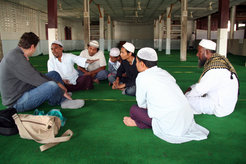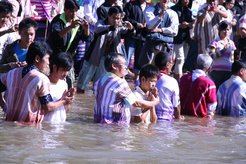Doing fieldwork with religious missionary networks - examples from the Tablighi Jama’at al-Dawa and Christian Baptist missionaries in Northwestern Thailand
by Alexander Horstmann
Doing fieldwork with religious missionary networks is a methodological challenge. In order to get an insider perspective, it is necessary to have access to the religious movement. This is not an easy task. In the November blog, Boris Nieswand showed that the fieldwork entry in Germany can be a complex and difficult story with its own dynamics. What is it like for a white European anthropologist to do research with conservative religious missionaries - Muslim and Christian - in Thailand? Here, I want to recount some experiences I had during my fieldwork with, on the one hand, the Islamic missionary dawa movement Tablighi Jama’at and, on the other hand, with the Christian Baptist missionaries. Fieldwork entry is one of the keys of anthropological research, but also one of the best-kept secrets. Anthropologists rarely give insights into the dynamics of their fieldwork, although a smooth integration is rather the exception.
In October 2006, I approached a chapter of the Tablighi Jama’at in Ta Sala, Nakhonsrithammarat province. I had heard from my Thai Muslim assistant at Walailak University, where I was a visiting research fellow, that he sometimes joined the missionary tours of the missionary movement, which originally came from Northern India but has established itself in Muslim communities throughout Thailand.
The Tablighi members were actually very irritated about foreigners. I told them that I do research on Islam and would really appreciate gaining an inside view into the works of the Tablighi. I explained that I had previously studied Islamic culture in Pattani in the lower South and in Northern Malaysia (Kelantan). After overcoming the first irritation and after learning that I was not a tourist or a spy, I was encouraged to visit again soon. I was then allowed to do participant observation, writing notes and taking photographs.
I was constantly observed, but this was also to my advantage. The different leaders wanted to know what I was writing in my field-notes.

The author with members of a Jama’at in Mae Sot, Northwestern Thailand.
I was able to actually discuss my fieldnotes and my photographs with them, which allowed my informants to reflect on my data. After people developed trust in me, they also allowed me to visit the Islamic centre (Markaz) and to travel with them. At the markaz, the situation was more complicated. People approached me with great hostility and asked me whether I was Muslim or not. If I was not Muslim, why was I there? I explained that I had come with my new acquaintances. I was able to record the sermons, but did not participate in the prayers. For this reason, I had to look for a tea-shop or walk around, which is not always comfortable.
While travelling, I was able to record the ritual cycle of the Tablighi Jama’at. Local Muslims that we visited were again slightly confused about the European researcher following the Jama’at. I was easily defined as one travelling member of the Tablighi’s platoon-like Jama’at groups. I also visited some local Muslims in their houses and explained my purpose of understanding the different Muslim sections and the impact of the revivalist movements in particular. I was permitted to visit the central markaz in Yala. I also joined a congregation (ijtima) in Bangkok where thousands of Muslims came together to listen to the sermon of an important Mawlana from India. I kept a very low profile, because I was really concerned about other Muslims being upset about my presence. Finally, I was able to fix an appointment with the leader of the Thailand chapter of the Tablighi Jama’at. That meeting went surprisingly well and the amir was very soft and gentle.
Travelling with the Tablighi thus demanded my total involvement with the movement, day and night, and I hardly had any time to lie back and reflect on my data. Until the last day, everybody in the Jama’at hoped that I would finally convert or convert soon. When we were exchanging our data, I was very surprised to learn that some researchers actually had a temporary Islamic identity and were “dressed up” by the Tablighi in order to have access. I think it is ethically ok to adjust a bit to the field and wear a veil in order to participate. But my question is: where is the limit of that involvement? Being a temporary Muslim means that you also participate in prayers, visit people and invite them to prayers, participate in study sessions and ritual.
After completing some articles on the Tablighi Jama’at, I switched to Christian missionary networks along the Thai-Burmese border. The Christian Baptist missionaries work among the Karen people who live in Thailand and Myanmar. The experience of the Karen has been harrowing. Hundreds of thousands of displaced Karen people fleeing from horrible human rights violations roam through Thailand or stay in refugee camps along the border. Again I had a gatekeeper, this time a Karen friend who is a Catholic priest and a PhD student at Chiang Mai University. He introduced me to his sister’s family in a border village. People in the village did not ask me for my religious affiliation, because they assumed that I was Christian. But they also assumed that I would go to the services on Sunday and participate in prayer and bible study sessions. Of course I was interested in recording services and meeting the pastor of the church. I was warmly welcomed.

Another problem emerged: The Christian intellectuals began to organize my fieldwork for me. I had to stop them and use other contacts to NGOs and Thai friends to organize my own fieldwork. However, I received warm, full support, because I was a Christian “brother”. I did not feel entirely well in this role, either. Christians also have hard times understanding why I also care for other people, let’s say, Muslims. The representation of my own self, then, shaped in no minor way the outcome of my fieldwork.
Doing research with missionary movement thus hardly allows us to take a convenient outsider perspective, but requires empathy and involvement. The dynamics of fieldwork in religious missionary movements are such that a clear position was needed that did not fall into the trap of inclusion/exclusion that is a typical pattern of the religious missionaries’ ideology.













